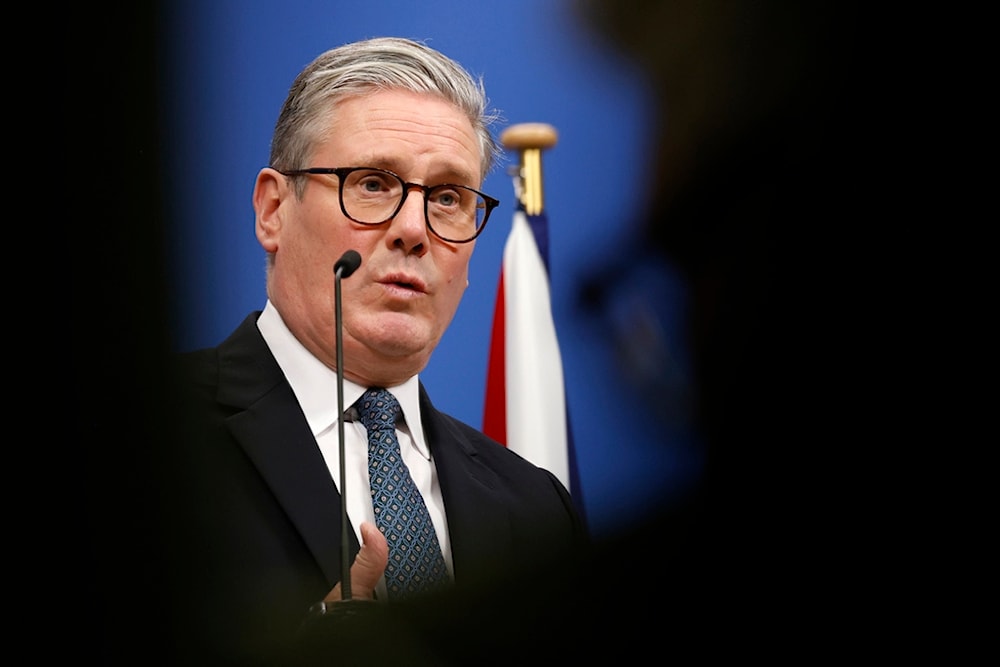UK PM Starmer says ready to deploy troops to Ukraine 'if necessary'
This comes as leaders from the UK, Germany, Italy, Poland, Spain, the Netherlands, and Denmark are expected to attend a Paris meeting taking place just ahead of the third anniversary of the start of the war.
-

Britain's Prime Minister Keir Starmer speaks during a press conference at NATO headquarters in Brussels, Monday, February 3, 2025. (AP)
UK Prime Minister Keir Starmer expressed his readiness to deploy troops to Ukraine "if necessary", just hours before European leaders convene in Paris on Monday to address Washington’s unexpected policy shift on the war.
Last week, US President Donald Trump bypassed Kiev and its European allies by engaging directly with Russian President Vladimir Putin to discuss potential negotiations to end the conflict. As Trump signals he could meet Putin "very soon", European leaders are rushing to Paris for high-level discussions on the continent’s security.
Calling the situation a "once-in-a-generation moment", Starmer affirmed his willingness to place "our own troops on the ground if necessary." Writing in The Daily Telegraph late Sunday, he emphasized that "any role in helping to guarantee Ukraine’s security is helping to guarantee the security of our continent, and the security of this country."
Trump has said that Putin genuinely seeks to end hostilities in Ukraine, while his administration has made it clear that Europe will no longer be its primary security focus. Meanwhile, US Defense Secretary Pete Hegseth has suggested that Ukraine's NATO membership and the full restoration of its territory are unlikely.
Leaders from the UK, Germany, Italy, Poland, Spain, the Netherlands, and Denmark are expected to attend the Paris meeting, which takes place just ahead of the third anniversary of the start of the war in Ukraine on February 24. Also in attendance will be European Council President Antonio Costa, European Commission President Ursula von der Leyen, and NATO Secretary General Mark Rutte.
The French presidency stated that discussions would center on "the situation in Ukraine" and "security in Europe." An advisor to President Emmanuel Macron noted that given the recent acceleration of developments in Ukraine and shifting US rhetoric, European nations must enhance their collective security efforts "better and in a coherent way."
Meanwhile, the Kremlin has proposed US-Russia negotiations in Saudi Arabia—expected in the coming days—to discuss not only the Ukraine war but broader European security concerns. European leaders fear Putin may revive demands he made before the start of the war, including limits on NATO forces in Eastern Europe and reduced US military involvement on the continent.
However, US Secretary of State Marco Rubio tempered expectations of an imminent breakthrough in negotiations with Russia.
"A process towards peace is not a one-meeting thing," he told the CBS network on Sunday, adding that "nothing's been finalised yet."
The top US diplomat described the discussions as an initial step toward a broader conversation that "would include Ukraine and would involve the end of the war."
Rubio is set to travel to Saudi Arabia on Monday as part of a Middle East tour that began over the weekend in occupied Palestine territories.
Meanwhile, Trump’s special envoy to Ukraine, Keith Kellogg, indicated that while European nations would not be directly involved in the negotiations, they would still have "input".
On Saturday, Ukrainian President Volodymyr Zelensky called for the establishment of a European army, arguing that the continent could no longer rely on Washington.
During a meeting in Paris last week, the foreign ministers of France, Germany, and Spain reiterated that any "just and lasting peace" in Ukraine must include Kiev and its European partners.
Read more: Zelensky advisor denies Ukraine would participate in Russia-US talks

 4 Min Read
4 Min Read











